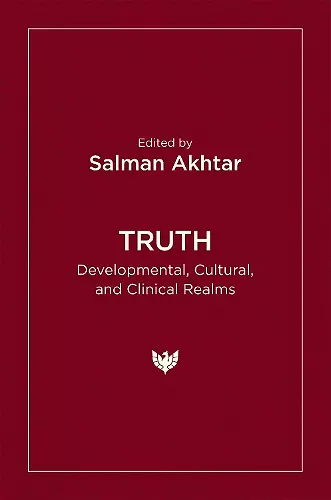Truth
Developmental, Cultural, and Clinical Realms
Format:Paperback
Publisher:Karnac Books
Published:16th Nov '23
Should be back in stock very soon

This edited collection gathers together erudite and considered contributions from Salman Akhtar, Cobi Avshalom, Brett Clarke, Mali Mann, Gila Ofer, Thomas Ogden, Louis Rothschild, Batya Shoshani, Michael Shoshani, Naama Shoshani-Breda, Ann Smolen, Donald Spence, Richard Waugaman, Thomas Wolman, and Vamık D. Volkan.
Fifteen distinguished authors bring together their vast experience as psychologists, psychiatrists, psychoanalysts, social workers, and psychotherapists to present a nuanced and in-depth investigation into the concept of truth. Divided into five parts, the book begins with a thoughtful discussion from Brett Clarke on what truth means and its role in psychoanalysis. It then moves into the realm of development, looking at truth from the viewpoint of children, adolescents, and adults. Stepping from development to culture, the works of Shakespeare, Heidegger and Freud are brought into the debate alongside the relationship of truth with individual and large-group psychology. Next come four chapters taking ‘truth’ into the clinical realm, grounding theory in practice. The book is brought to completion by an epilogue from Louis Rothschild answering the vital question: ‘Truly, what does all this mean?’
A must-read book for practising clinicians and academics in the mental health and humanities fields that investigates the wide range of theories on truth, how they have changed over the years, and their practical applications.
'The contributing authors write with academic terminology and authority. [...] This book's academic stance would be of particular interest to researchers and readers working in the psychoanalytic field. [...] It offered both information and challenges to my present understanding of the truth.'
-- Dr Barbara Mitchels, FBACP, Therapy Today, Sept 2024Bion said that the psyche needs truth to grow the way the body needs alimentation. But what is truth in psychoanalysis? To whom does it belong and by what means do we come to know it? Is truth found? Created? Given the ineffable quality of psychic reality, the determination of what is true in the clinical situation is complex and can be very elusive. Both analyst and patient are inevitably confronted with the “essential, constitutive tension at the heart of [psychoanalytic] theory” and must mediate “between a language of force and energy, on the one hand, and a language of reasons, intentions, and meanings, on the other.” This wide-ranging volume offers readers at all levels of analytic experience an encyclopedic and authoritative exploration of the problematics of truth that should prove essential for the continued development of our psychoanalytic theories and clinical models as we move forward into the twenty-first century.
-- Howard B. Levine, MD Editor-in-Chief, The Routledge Wilfred R. Bion Studies Book Series, and co-editor of 'Autistic Phenomena and Unrepresented States: Explorations in the Emergence of Self'Truth has always been at the heart of psychoanalysis. But given its enigmatic nature and its location in the land of ghostly schemata, can we really arrive at it? What is “manufactured” truth and how is it to be thought of in the clinic where “narrative,” “historical,” and “poetic” truth jostle against each other? Here is a moving homage to this vexing subject by Salman Akhtar, who creates a prismatic meditation by weaving together essays that are as wide-ranging as they are lively and profound.
-- Nilofer Kaul, PhD Training and Supervising Analyst, New Delhi, India, and author of 'Plato’s Ghost: Minus Links and Liminality in Psychoanalytic Practice'As Salman Akhtar points out in this volume, the notion of “truth” is something we tend to take for granted, but is in fact an ill-defined concept when one tries to pin it down. This volume brings together a number of distinguished psychoanalytic authors who challenge us to reassess our notions of truth, both within psychoanalysis and beyond. In this age of “alternative facts,” such a volume is sorely needed and will be of interest not only to psychoanalysts and psychotherapists, but to those coming from the humanities as well.
-- Dimitris J. Jackson, Training Analyst and Member, Hellenic Psychoanalytical Society, Representative, Europe Region, International Psychoanalytical AssociaISBN: 9781800131422
Dimensions: 246mm x 189mm x 14mm
Weight: 514g
260 pages